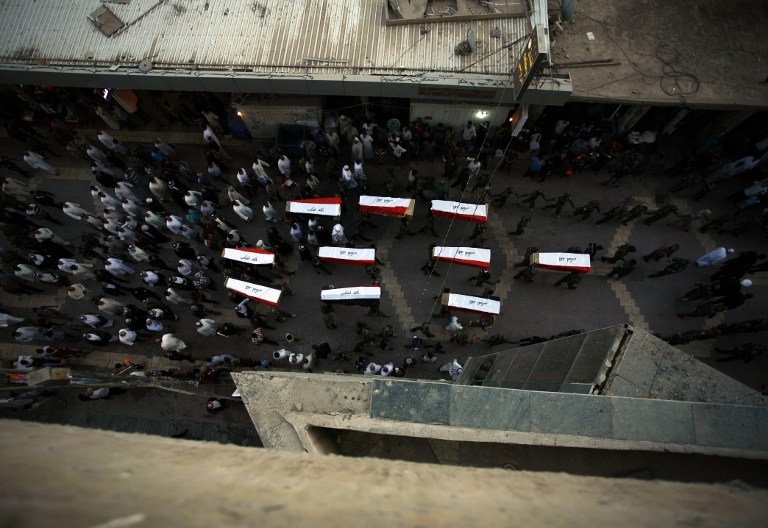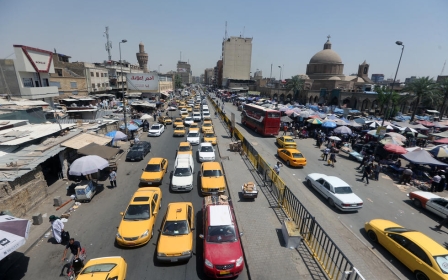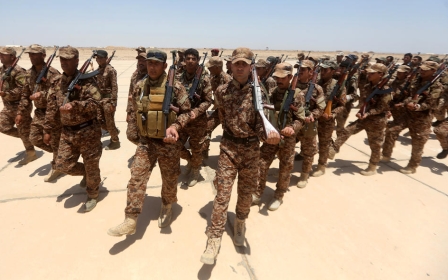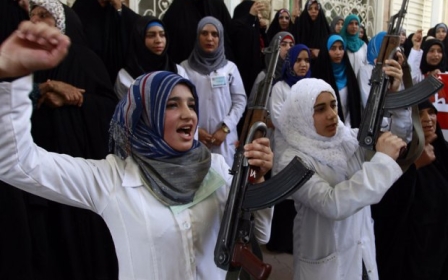Iraq court sentences 24 to hang over Tikrit massacre

An Iraqi court sentenced 24 men to death by hanging Wednesday over the June 2014 massacre by militants of hundreds of mostly Shiite military recruits in Tikrit.
The central criminal court in Baghdad handed 24 of the 28 defendants the maximum sentence over the "Speicher" massacre, named after the base from which the victims were captured before being executed.
Local news sites reported that the judgement was handed down in the midst of heightened security, after relatives of some of those killed attempted to approach the defendants.
"After deliberations, the court finds that the evidence collected is sufficient to convict 24 defendants," said the judge. "The court decided they will be executed by hanging."
All 24 denied any involvement in the massacre, committed during the first days of the Islamic State group's broad offensive in Iraq last June - four other defendants were freed.
Around 600 bodies of victims have been exhumed from burial sites in the Tikrit area.
Last week 170 families in the Shia shrine city on Najaf in central Iraq received the bodies of loved ones killed in the massacre, which the New York Times has called a sectarian crime unparalleled since the rule of Saddam Hussein.
According to reports at the time, members of IS led an attack by armed Sunni militants on Tikrit, and claimed to have killed around 1,700 cadets at the Salahuddin province air base, 80 kilometres north of Baghdad.
Footage released by IS last year showed some of the captured recruits being shot and pushed into the Tigris river.
The Iraqi government, led by President Haider al-Abadi, has been under intense pressure to be seen to act in the wake of the massacre.
Many families of the victims have been angered by the slow identification process, which has seen the majority of relatives without confirmation that their loved ones were among the dead.
Last September hundreds of furious relatives stormed the Iraqi parliament building in Baghdad, demanding accountability for the officers who were in charge on the day when IS militants overran the training camp.
The parliament later heard during its investigation that commanders fled the base ahead of the IS advance, in contravention of orders from higher officers.
Though the massacre has become a hot-button political issue in Iraq, the death sentence was condemned by some, who questioned the fairness of the judgement.
"Unfortunately, this is what the US model of democracy has led to: no security or stability, no human rights, no due process or rule of law, and much mayhem, carnage and corruption," Burhan al-Chalabi, former Chairman of the British Iraqi Foundation, told Middle East Eye on Wednesday.
However, Iraq's Minister for Human Rights Mohammed al-Bayati denied any allegations of improper conduct by the court, telling MEE that 15 of those convicted had in fact admitted to taking part in the massacre.
"The judgement was handed down according to the standards of justice in Iraq. The families of the victims are facing huge problems after losing their loved ones."
New MEE newsletter: Jerusalem Dispatch
Sign up to get the latest insights and analysis on Israel-Palestine, alongside Turkey Unpacked and other MEE newsletters
Middle East Eye delivers independent and unrivalled coverage and analysis of the Middle East, North Africa and beyond. To learn more about republishing this content and the associated fees, please fill out this form. More about MEE can be found here.




